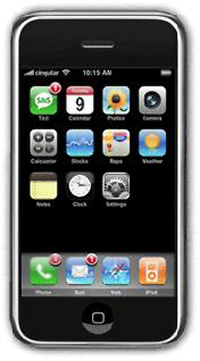 The next time you go to your doctors office, check to see if he/she is using an iPhone, along with a stethoscope and blood pressure cuff, to evaluate your health.
The next time you go to your doctors office, check to see if he/she is using an iPhone, along with a stethoscope and blood pressure cuff, to evaluate your health.
With Apples announcement that it is allowing third party developers to create applications on the iPhone, Datamonitor believes that healthcare technology applications particularly electronic health records (EHRs) and clinical decision support (CDS) will be more likely to be adopted by physicians, translating into better healthcare for patients.
EHRs allow providers to access all the information on a patient in one place, giving them more information at the point of care. CDS tools help providers sort through the huge amount of patient data and medical literature now available, checking, for example, if the medication they are about to prescribe will interact with a drug the patient is already taking.
Physicians have been slow to adopt EHRs and CDS during the past few years, in part because using a computer in the middle of a patient exam disrupts the dynamic of the patient/provider relationship and it slows down doctors normal work patterns. Mobile devices like the iPhone can help alleviate these issues and encourage more doctors to use these new life-saving technologies.
The iPhone, however, stands out from the rest of the currently available devices because of its functionality, easy of use and, quite frankly, appearance. The iPhones functionality is undisputed as a phone, camera, media device and web browser all in one device who needs anything else? Healthcare providers dont want to carry around a beeper, hospital-issued phone, cell phone, BlackBerry and Tablet PC with them as they run through the corridors of a hospital. They want to carry around one device that can do everything and thats what the iPhone is.
Why does a physician need a camera or iPod you might ask? Well, if you go to your primary care physician with a strange rash on your arm, your doctor could, hypothetically, take a picture of it and send it to a dermatologist for a second opinion. If you cant remember what kind of medication youre on, but you can remember what it looks like, your doctor can pull up pictures of drugs, right on the iPhone, that fit your description and figure out what youre taking. For the iPod function, a doctor may want to take a quick refresher course on the different sounds a heart makes when the heart valve isnt functioning properly. The possibilities are endless.
With no little buttons to push, the iPhones touch screen brings easy to use technology to even the most techno phobic provider. Zoom in capabilities (that will be particularly useful when looking at x-rays, MRIs, etc.) and the ability to flick through screens are other features that will make it easier, rather than more difficult, for providers to enter in and sort through patient information. Furthermore, because the iPhone connects to Wi-Fi networks, and most hospitals have or are currently installing Wi-Fi, accessing the internet is easy and fast. Of course, if no wireless internet connection is available, an application on the iPhone will still be able to function. The fact that the iPhone has become a kind of status symbol and is attractive to look at and own doesnt hurt the prospects for provider adoption either.
Developing an application on the iPhone, as opposed to other mobile devices, allows for increased functionality and innovation as Epocrates, a clinical information and decision support tools company, has already demonstrated. While the current exclusive contract with AT&T is a drawback for end-user adoption, healthcare technology vendors nevertheless should be clamoring to create applications specific to the iPhone. Doctors want to use this device; for the first time, theyre waiting for technology to catch up to them.
About Datamonitor
Datamonitor is a world leading provider of online data, analytic and forecasting platforms for key vertical sectors. We help our clients, 5,000 of the worlds leading companies profit from better, more timely decisions. Through our proprietary databases and wealth of expertise, we provide clients with unbiased expert analysis and in-depth forecasts for seven industry sectors: Automotive & Logistics, Consumer Markets, Energy, Financial Services, Healthcare, Retail and Technology. Datamonitor maintains its headquarters in London and has regional offices in Frankfurt, New York, San Francisco and Sydney.

Add a Comment
No messages on this article yet